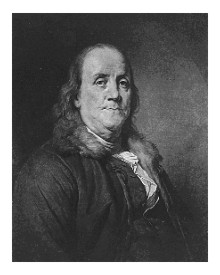Sponsor this page. Your banner or text ad can fill the space above.
Click here to Sponsor the page and how to reserve your ad.
-
Timeline
1788 Detail
October 24, 1788 - Sarah Josepha Hale, American author of the nursery rhyme, "Mary Had a Little Lamb" and her campaign to officially recognize Thanksgiving as a holiday, is born.

Sarah's parents were Captain Gordon Buell and Martha Whittlesay Buell. He was a veteran of the American Revolution. Her brother, Horatio, had attended Dartmouth, and between he and her mother, they home schooled Sarah and she became the local schoolteacher. In 1837, Sarah credited her mother for her interest in all things literary.
"I owe my early predilection for literary pursuits to the teaching and example of my mother. She had enjoyed uncommon advantages of education for a female of her times - possessed a mind clear as rock-water, and a most happy talent of communicating knowledge," Sarah Josepha Hale, 1837.
When Sarah was twenty-three, her father opened a tavern, the Rising Sun, and the daughter met her husband David Hale that year and married two years later. They had five children before tragedy struck several weeks before the fifth child was born; her husband died in 1822.

Publication and Success
Despite the tragedy, Sarah Josepha Hale moved forward, raising her children and continuing her career. In 1823, with assistance from David's freemason lodge, she published her first collection of poems, "The Genius of Oblivion." Four years later, she published her first novel, "Northwood: Life North and South," one of the first books about slavery. It supported relocating slaves to Liberia, a notion that was ahead of its time, not occuring until 1822. The novel was a big success.
With the success of Northwood, she was asked to move to Boston and edit one of the first magazines for women, "Ladies' Magazine," which she did from 1828 to 1836. During this time, she also wrote, "Poems for Our Children," which included her most favorite children's rhyme, "Mary Had a Little Lamb," in 1830.
Louis Antoine Godey of Philadelphia also had a women's magazine called, "Godey's Lady's Book," which he purchased and merged with the "Ladies' Magazine," into a publication called "American Ladies' Magazine." He asked Sarah Josepha Hale to edit it; she did so for forty years. It became the largest magazine of its day, reaching one hundred and fifty thousand subscribers. This made Hale one of the largest influencers of the era, in fashion, culture, and beyond. She became a big advocate for higher education for women, and helped found Vassar College.

Hale, Lincoln, and Thanksgiving
Although she stayed away from some of the most important female political issues of the day, i.e. the suffragette movement, that did not mean that she saw a woman's role as less than a man's, just different. Hale strongly believed in the American nation, was against slavery, and for keeping the union together. She believed that the holiday of Thanksgiving, a New England staple, but unknown in the South, should be a national holiday and began advocating for this in 1846. She wrote the Presidents of the day on the topic; Taylor, Fillmore, Pierce, Buchanan, and Lincoln, but only Lincoln took up the idea, supporting its legislation in 1863 and choosing its date as the last Thursday in November in a proclamation issued on October 3, 1863, one week after reading her letter on the topic.
Sarah Josepha Hale's Letter to Lincoln
From Sarah J. Hale to Abraham Lincoln1, September 28, 1863
Private
Philadelphia, Sept. 28th 1863.
Sir.--
Permit me, as Editress of the "Lady's Book", to request a few minutes of your precious time, while laying before you a subject of deep interest to myself and -- as I trust -- even to the President of our Republic, of some importance. This subject is to have the day of our annual Thanksgiving made a National and fixed Union Festival.
You may have observed that, for some years past, there has been an increasing interest felt in our land to have the Thanksgiving held on the same day, in all the States; it now needs National recognition and authoritive fixation, only, to become permanently, an American custom and institution.
Enclosed are three papers (being printed these are easily read) which will make the idea and its progress clear and show also the popularity of the plan.
For the last fifteen years I have set forth this idea in the "Lady's Book", and placed the papers before the Governors of all the States and Territories -- also I have sent these to our Ministers abroad, and our Missionaries to the heathen -- and commanders in the Navy. From the recipients I have received, uniformly the most kind approval. Two of these letters, one from Governor (now General) Banks and one from Governor Morgan are enclosed; both gentlemen as you will see, have nobly aided to bring about the desired Thanksgiving Union.
But I find there are obstacles not possible to be overcome without legislative aid -- that each State should, by statute, make it obligatory on the Governor to appoint the last Thursday of November, annually, as Thanksgiving Day; -- or, as this way would require years to be realized, it has ocurred to me that a proclamation from the President of the United States would be the best, surest and most fitting method of National appointment.
I have written to my friend, Hon. Wm. H. Seward, and requested him to confer with President Lincoln on this subject As the President of the United States has the power of appointments for the District of Columbia and the Territories; also for the Army and Navy and all American citizens abroad who claim protection from the U. S. Flag -- could he not, with right as well as duty, issue his proclamation for a Day of National Thanksgiving for all the above classes of persons? And would it not be fitting and
patriotic for him to appeal to the Governors of all the States, inviting and commending these to unite in issuing proclamations for the last Thursday in November as the Day of Thanksgiving for the people of each State? Thus the great Union Festival of America would be established.
Now the purpose of this letter is to entreat President Lincoln to put forth his Proclamation, appointing the last Thursday in November (which falls this year on the 26th) as the National Thanksgiving for all those classes of people who are under the National Government particularly, and commending this Union Thanksgiving to each State Executive: thus, by the noble example and action of the President of the United States, the permanency and unity of our Great American Festival of Thanksgiving would be forever secured.
An immediate proclamation would be necessary, so as to reach all the States in season for State appointments, also to anticipate the early appointments by Governors.
Excuse the liberty I have taken
With profound respect
Yours truly
Sarah Josepha Hale,
Editress of the "Ladys Book"
However, this letter, which earned her the title, "Mother of Thanksgiving" was far from her only achievement on the edge of national political policy. Sarah Josepha Hale worked on the preservation of Mount Vernon and for completion of the statue at Bunker Hill. She would pass at the age of ninety, in 1879.
Photo above: Montage (left) Portrait of Sarah Josepha Hale, 1831, James Reid Lambdin. Courtesy Wikipedia Commons; (right) Letter from Sarah Hale to President Lincoln about making Thanksgiving a Holiday, 1863, Sarah Hale. Courtesy Library of Congress via Wikipedia Commons. Below: Chromolithograph of "Mary Had a Little Lamb," 1903, O.C. Malcolm. Courtesy Library of Congress. Sources: "The Godmother of Thanksgiving, The Story of Sarah Josepha Hale," 2007, Peggy M. Baker, Pilgrim Hall Museum; Library of Congress; Wikipedia Commons.







